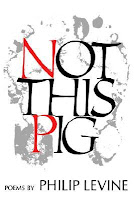The second book by working class American poet, and poet laureate, Philip Levine (1928-2015).
Poetry Review: Not This Pig was Philip Levine's second book, published at age 40, five years after his first, On the Edge. During his lifetime he won two National Book Awards, the Pulitzer prize in 1995, and in 2011 was appointed poet laureate of the United States. Levine was a proud poet of the working class, born in the industrial city of Detroit, then still car maker to the world. He was influenced by Spanish poetry, having traveled there and having read Garcia Lorca, Jimenez, Machado, Alberti, among others. He also was an admirer of John Keats, and edited a collection of Keats's poems. In this early collection, Levine wrote often about work, family, time and memory. His wife, children, father live here. In Not This Pig, people and places are named: Eugene, Little Joe, Dr. Leo, Lonnie; Toledo, Dubuque, Fresno, Barcelona. The late 60's were a turbulent time in America, and he wrote of Latinos, blacks, Jews. He wrote of things that are used, are worn from use, and of work. Levine describes the assembly line: "the slow elephant feet/of the presses sliding down/in grooves"; lunch break: "marked/my bread with the black/print of my thumb/and ate it,"; mornings on the job: "it's 5:30, middle June./I rise, dress,/assume my name/and feel my/face against a hard towel." Perhaps in part because of the Spanish poets, in these poems Levine takes everyday incidents and finds the poetry in the moment, abstracting it from the commonplace, placing it at a higher level, a better thought. As such, although there is something valuable to be found in each of the poems, some are difficult to understand, and I won't lie, some are downright baffling (the titles are often a valuable clue). Here are bits of four of the poems that stood out to me:
"To a Child Trapped in a Barber Shop"
You think your life is over?
It's just begun.
"The Midget"
no one hears or no one cares
that I sing to this late born freak
of the old world swelling my lap,
I sing lullaby, and sing.
"Animals Are Passing from Our Lives"
The boy
who drives me along believes
that any moment I'll fall
on my side and drum my toes
like a typewriter or squeal
and shit like a new housewife
discovering television
"Baby Villon":
... he holds my shoulders,
Kisses my lips, his eyes still open,
My imaginary brother, my cousin,
Myself made otherwise by all his pain.
This was only his second book, but already the strengths that mark Levine's later work were visible. In Not This Pig Philip Levine sees the real world through a poetic veil, but he sees the real world. [3½★]

No comments:
Post a Comment